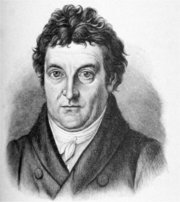Johann Gottlieb Fichte
|
|
Johann Gottlieb Fichte (May 19, 1762 - January 27, 1814) has significance in the history of Western philosophy as one of the progenitors of German idealism and as a follower of Kant.
Fichte did not endorse Kant's argument for the existence of noumena, of "things as they are", not just as they are perceived through the categories of human reason. Fichte saw the rigorous and systematic separation of "things as they are" (noumena) and things "as they appear to be" (phenomena) as an invitation to skepticism.
Rather than invite such skepticism, Fichte made the radical suggestion that we should throw out the notion of a noumenal world and instead accept the fact that consciousness does not have a grounding in a so-called "real world". In fact, Fichte achieved fame for originating the argument that consciousness is not grounded in anything outside of itself. This notion eventually became the defining characteristic of German Idealism and thus an essential underpinning to understanding the philosophies of Hegel, and of Arthur Schopenhauer, though they both reject Fichte's notion that human consciousness is itself sufficient ground for experience, and therefore postulate another "absolute" consciousness.
In 1806, in a Berlin occupied by Napoléon, Fichte gave a series of Addresses to the German Nation which became an incentive for German nationalism. Here, Fichte indirectly continues his anti-Semitic argumentation from his early works on religion and the French Revolution.
His son Immanuel Hermann Fichte also made contributions to philosophy.
At age 51 Fichte died of typhus.
Bibliography
Primary Sources:
Early Philosophical Writings Edited and translated by Daniel Breazeale. Ithaca: Cornell University Press, 1988
Foundations of the Transcendental Philosophy (Wissenschaftslehre) Nova Methodo (1796-1799) Edited and translated by Daniel Breazeale. Ithaca: Cornell University Press, 1992
Introduction to the Wissenschaftslehre and Other Writings (1797 - 1800) Edited and translated by Daniel Breazeale. Indianapolis: Hackett, 1994
Attempt at a Critique of All Revelation (1792,93) Translated by Garret Green. New York: Cambridge University Press, 1978
Science of Knowledge with the First and Second Introductions Translated by Peter Heath and John Lachs. Cambridge: Cambridge University Press, 1982
Addresses to the German Nation Edited by George Armstrong Kelly. Translated by R F Jones and George Henry Turnbull. New York: Harper & Row, 1968
Foundations of Natural Right Edited by Frederick Neuhouser. Translated by Michael Baur. Cambridge: Cambridge University Press, 2000
The Vocation of Man Translated by Peter Preuss. Indianapolis: Hackett, 1987
Secondary Sources (English):
Daniel Breazeale. "Fichte's 'Aenesidemus' Review and the Transformation of German Idealism" The Review of Metaphysics 34 (1980/1) 545-68.
Daniel Breazeale and Thomas Rockmore (eds) Fichte: Historical Contexts/Contemporary Controversies. Atlantic Highlands: Humanities Press, 1997.
Dieter Henrich. "Fichte's Original Insight" Contemporary German Philosophy 1 (1982) 15-52.
Wayne Martin. Idealism and Objectivity: Understanding Fichte's Jena Project. Stanford: Stanford University Press, 1997.
Frederick Neuhouser. Fichte's Theory of Subjectivity. Cambridge: Cambridge University Press, 1990.
Robert R Williams. Recognition: Fichte and Schelling on the Other. Albany: State University of New York Press, 1992.
Gunther Zoller. Fichte's Transcendental Philosophy: The Original Duplicity of Intelligence and Will. Cambridge: Cambridge University Press, 1998.
External links
- Outlines of the Doctrine of Knowledge (http://www.marxists.org/reference/subject/philosophy/works/ge/fichte.htm)
- Stanford Encyclopedia of Philosophy Entry (http://plato.stanford.edu/entries/johann-fichte/)cs:Gottlieb Fichte
de:Johann Gottlieb Fichte eo:Johann Gottlieb FICHTE fr:Johann Gottlieb Fichte he:יוהאן גוטליב פיכטה it:Johann Gottlieb Fichte ja:ヨハン・ゴットリープ・フィヒテ no:Johann Gottlieb Fichte pl:Johann Gottlieb Fichte ru:Фихте, Иоганн Готлиб sk:Johann Gottlieb Fichte sv:Johann Gottlieb Fichte

